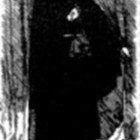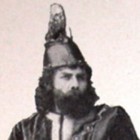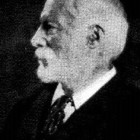William Ludwig Suggest updates
William Ledwidge.
Born Dublin, 15 July 1847.
Died London, 25 December 1923.
Irish baritone.
From 1880 to the end of the century, William Ludwig was one of the most famous baritones in Britain.
Ludwig also toured extensively in the United States where he sang to great acclaim, especially in Wagnerian roles. He was particularly noted for his interpretation of the Dutchman.
Ludwig was a stalwart of Carl Rosa Opera. Our listing of the roles he sang is still incomplete, but from his first appearance on the operatic stage in Scotland in 1876, to the last in 1897, he appeared in twenty-two different roles. Notably, he was the first to play Wotan on the operatic stage in Scotland in Valkyrie (1896).
Ludwig came from a musical family, his father being a chorister, copyist, music teacher and member of many church choirs in Dublin. Ludwig also began as a chorister and spent time in a solicitor's office before turning to a musical career. In 1874 he moved to London and soon joined the Carl Rosa company.
It is said that when the great Charles Santley retired from the operatic stage he left his valuable wardrobe to Ludwig as a parting gift.
Why did Ludwig change his name?
Then as now this was not unusual among performers. Ludwig performed in an era when British audiences seem to have thought a European pedigree a guarantee of quality. Those lucky enough to train or work in other countries would often adopt a style which those non-English speaking audiences would find easier. Thus Ledwidge does not trip easily off the Germanic tongue. Similarly, A J Foley (1835-1899), an Irish bass, studied in Naples, and adopted the form Foli, which stayed with him throughout his career.
This habit persisted even into the twentieth century, when Dame Maggie Teyte (1888-1976) adopted that form because French audiences mispronounced Tate.
Supporting information
No recordings of Ludwig have been identified, though he sang until about 1909 and so could have made one.
Photographs have proved elusive too. Given how well known Ludwig was - he is mentioned by James Joyce - this was a puzzle. But it seems that he had an eye defect so he features either in shadow or profile, as in this photograph used at the time of his benefit concert,
Obituary from The Stage, Thursday, 3 January 1924, p13.
'With the knowledge that his health had been weak for a long time, I am not surprised at the death of William Ludwig.
Ludwig's real name was Ledwidge, and his father was a tenor singer in the Dublin Cathedral choir. and one of the best copyists I have known. I never saw anything so near copperplate.
The son was educated at the National Schools, and went through many hardships. His first appearance on the stage was in the chorus and small parts with John Hollingshead at the Gaiety in the seventies. Afterwards he returned to Dublin and was heard by the great Carl Rosa, who cast him for Vanderdecken in The Flying Dutchman. This was a wonderful performance. He was tall and 'Gaunt and weird' a cast in one eye gave his Vanderdecken an eerie look.
'Many other successes may be accredited to a long career, and especially his Danny Mann in The Lily of Killarney, where the aria of 'The Colleen Bawn' gave him scope, and it was a sensational hit.
Revised 10 June 2020
Roles in Scotland
- Ferrando captain of Di Luna's guard
-
Trovatore 1876
- Charles II King of Spain
-
Maritana 1876
- Squire Corrigan holder of a mortgage on the Cregan lands
-
Lily of Killarney 1876
Lily of Killarney 1877
- Lieutenant of Italian troops, in pay of Mazarin
-
Water Carrier 1876
- Valentin Marguerite's brother
-
Faust 1876
Faust 1877
- Bracaccio leader of the Pirates
-
Satanella 1877
- Ford Herr Fluth, a Windsor merchant
-
Lustigen Weiber von Windsor 1877
- Sir Reginald d' Bracy Sheriff of Nottingham
-
Robin Hood 1877
- Count Arnheim Governor of Pressburg
-
Bohemian Girl 1877
Bohemian Girl 1895
Bohemian Girl 1896
- Montalban
-
Siege of Rochelle 1877
- Dutchman
-
Fliegende Holländer 1877
Fliegende Holländer 1882
Fliegende Holländer 1895
- Count di Luna a young noble of Aragon
-
Trovatore 1877
- Friedrich von Telramund Count of Brabant
-
Lohengrin 1881
- Méphistophélès the devil
-
Faust 1882
Faust 1896
Faust 1897
- Claude Frollo Archdeacon of Notre Dame
-
Esmeralda 1883
- Don Pizarro prison governor
-
Fidelio 1883
- Giuseppe Barracini
-
Colomba 1883
- Mefistofele the devil
-
Mefistofele 1884
- Wolfram von Eschenbach a knight and minnesinger
-
Tannhäuser 1896
Tannhäuser 1897
- Wotan father of the Valkyries and Volsungs
-
Valkyrie 1896
- Don José de Santarem
-
Maritana 1897
- Danny Mann a boatman, devoted to Hardress
-
Lily of Killarney 1911
- Bartolo a doctor, the Countess's former guardian
-
Nozze di Figaro 1911


